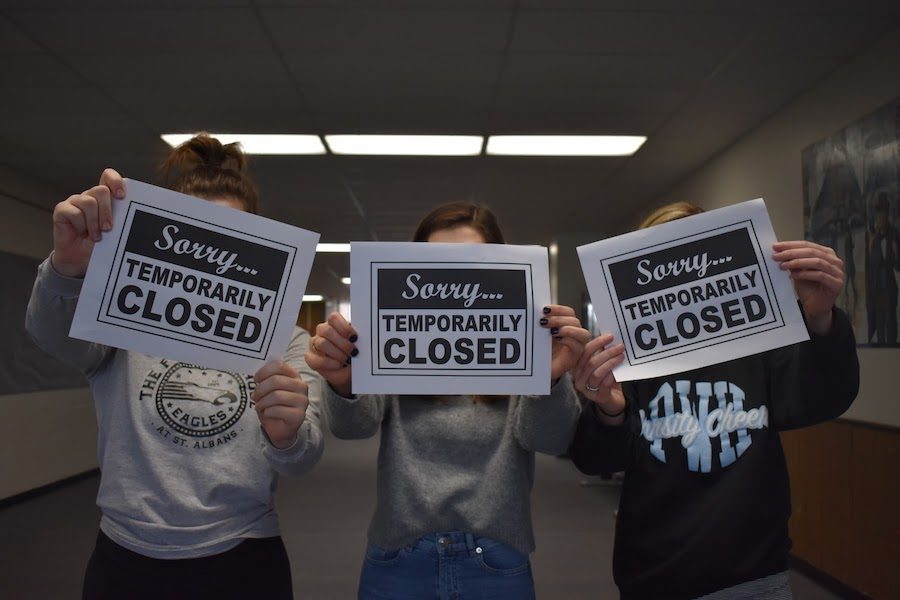After the longest government shutdown in United States history, government workers are still adjusting from the two paychecks that they missed during the 35-day period.
ŌĆ£Initially, we just figured the shutdown would be over in a short time. It was okay, and it was easier to go into work at the beginning,ŌĆØ Andy Ottensmeyer, father of juniors Lauren and Joel Ottensmeyer, said. ŌĆ£The longer it lasted, it just became more and more frustrating. It was a distraction from the job we were supposed to be doing.ŌĆØ
With their father working as an air traffic controller, the Ottensmeyer family had to sacrifice certain things and lean on their savings in order to get through the shutdown.
ŌĆ£We had to tell [our landlord] that we canŌĆÖt pay it this month. WeŌĆÖve been eating dinner at home a lot, and we donŌĆÖt really go out. WeŌĆÖre just trying to save money,ŌĆØ Lauren said. ŌĆ£ItŌĆÖs affecting a lot families, and itŌĆÖs not a good position for parents with four kids. We didnŌĆÖt pay for my lacrosse clinics this month, and we stopped going to the gym because we canŌĆÖt pay our monthly fee this month.ŌĆØ
The familyŌĆÖs frustration increased as the shutdown continued, but Andy stayed committed to doing his job.
ŌĆ£What motivated me was a couple things. One is that, as an air traffic controller, the planes are still flying, and you still have a duty to go in and do your job for the sake of keeping people safe. You have a commitment to the flying public to continue to do your job,ŌĆØ Andy said. ŌĆ£Plus you have a commitment to your coworkers who themselves are coming in and also working.ŌĆØ
Working at the Department of Veterans’ Affairs, junior Navy Williams-Harkins aunt, Stacy Williams, was not immediately affected by the shutdown due to the department’s budget being two years ahead. However, if the shutdown continues, her job will be affected, forcing her to lean on her second job.
“She has to take care of everyone else in her house, so she has to keep going,” Navy said. “She has to figure something out because that’s her only option.┬ĀThe government really needs to go ahead and fix this.”┬Ā
With another family member in the Air Force affected by the shutdown, Navy and Stacy feel frustrated that the shutdown could impact her family in this way.
ŌĆ£It’s irritating because she loves her job, but it’s still like, ‘I have to make a living out of this. I have a family, and I have kids to take care of,’ŌĆØ Navy said. ŌĆ£She doesn’t just do it for the money, but money is important in trying to make ends meet.ŌĆØ
While Stacy believes that shutdowns are beneficial in some circumstances, she does not feel that this one is worthwhile.┬Ā
“The shutdown can be used as an effective bargaining unit in certain circumstances,” Stacy said. “But in this instance, itŌĆÖs a clear abuse of power. The president does not have the United States citizens interests at heart.”
However, Andy does not view the shutdown as a partisan issue; instead, he blames both sides.
ŌĆ£I donŌĆÖt view this as a President Trump issue. I think his message about securing our border is something that nobody has wanted to deal with before. The politicians have not wanted to deal with that for 30 years, so there had to come a point where somebody was going to have to deal with it, and he chose to be the person to do that,ŌĆØ Andy said. ŌĆ£I donŌĆÖt blame President Trump, and I donŌĆÖt even blame the current Democrats; I blame all of the politicians for the last 30 years for not dealing with the issue.ŌĆØ



![Gazing up from the stage, junior Joseph McCurdy who played Peter Pan in the school play, Lost Girl, sits next to senior Juliana Rogers, who plays Wendy Darling, during a theater rehearsal. McCurdyŌĆÖs passion for theater began when he observed a West High production in middle school. ŌĆ£I've been in the high school theater program since I was a freshman. I've always loved theater, but [what prompted me to join] was [when] I went to see [a performance here] when I was in middle school, and it was super cool,ŌĆØ McCurdy said.](https://pwestpathfinder.com/wp-content/uploads/2025/11/IMG_6535-1200x798.jpeg)

![Standing tall, stacked in a precise formation, the cheer team strikes a signature pose during halftime on Sept. 12 at the varsity football game. Nearly a month after this performance, the cheer team performed at the Missouri Cheerleading Coaches Association (MCCA) regional competition on Oct. 4, 2025. ŌĆ£We've all come [to] work together a lot more,ŌĆØ sophomore Elyssa Philippi said. ŌĆ£We're a lot closer than we were [earlier in the season] and going to state has made us closer [in] trying to work with each other, learn [new] skills and make our team better.ŌĆØ](https://pwestpathfinder.com/wp-content/uploads/2025/11/DSC5139-1.jpg)
![Handing out candy to excited trunk-or-treaters, President of the United Nations ChildrenŌĆÖs Fund club and junior Sara Ashok represents that group. Ashok was eager to participate in this event for multiple reasons. ŌĆ£I really wanted to be a part of the event because I get to help create memories for kids and spend time with my friends, spreading the things [I'm passionate about],ŌĆØ Ashok said.](https://pwestpathfinder.com/wp-content/uploads/2025/11/DSC_8648-1-1200x800.jpg)

![Smiling in a sea of Longhorns, Fox 2 reporter Ty Hawkins joins junior Darren Young during the morning Oct. 3 pep rally. The last time West was featured in this segment was 2011. ŌĆ£[I hope people see this and think] if you come to [Parkway] West, you will have the time of your life because there are so many fun activities to do that make it feel like you belong here. I was surprised so many people attended, but it was a lot of fun,ŌĆØ Young said.](https://pwestpathfinder.com/wp-content/uploads/2025/10/Edited2-1200x798.jpg)
![West High seniors and families listen as a representative of The Scholarship Foundation of St. Louis, Teresa Steinkamp, leads a Free Application for Federal Student Aid (FAFSA) workshop. This session, held in the library, provided guidance on financial aid, scholarships and student loan options. ŌĆ£This event is very beneficial for any seniors who are applying to or considering applying to colleges after high school [because] the cost of college is on the rise for seniors and parents,ŌĆØ college and career counselor Chris Lorenz said.](https://pwestpathfinder.com/wp-content/uploads/2025/09/DSC_4478-1200x778.jpg)
![Senior Kamori Berry walks across the field during halftime at the Homecoming football game on Sept. 12. During the pep assembly earlier that day, she was pronounced Homecoming Queen. ŌĆ£I thought it was nice that the crowd [started] cheering right away. I know [my friends] were really excited for me, and my family was happy because typically non-white people don't win,ŌĆØ Berry said.](https://pwestpathfinder.com/wp-content/uploads/2025/09/DSC7046-Enhanced-NR-1200x798.jpg)


